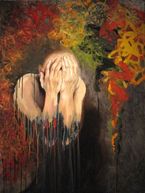 See photo gallery.My time in Astorga was my whale-belly time, a true separation from my known world and self. I was extremely depressed and could not see how I could complete my journey. At that point I was transitioning between worlds and selves. What I did not realize was that, as I lie miserable on a bunk in a municipal dormitory, a separation was being made between my old world and old self and my potential for a new world and new self. What I did not yet know was that, as my hope bled out, the experiences that were to shape my new world and self had already begun with this dark, unknown, and frightening experience. I found myself desperate to undergo the metamorphosis which indeed had already begun.
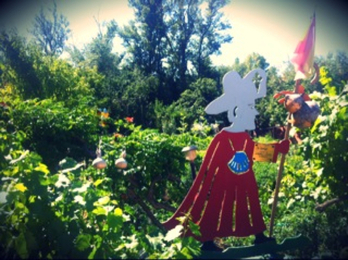 See photo gallery.Today was the worst day of the whole trip. (Hang with me, it will get better. The turnaround will happen in two days!) But this Twelfth Day of the Walk was a dirty-rotton-no-good-very-bleak day of miserable, horrible, painful, distressing hopeless walking. I left Leon at 6:00 a.m. and walked awhile in the dark. It started out great, as I excitedly walked passed a zoo where it sounded like the animals were being led by banshees and were rioting inside. Then, about an hour and a half later, something strange occurred. I had pain in every bit of me: fingers, neck, hands, arms, back as well as all the usual places. I guess the reason I was experiencing this all-over pain, and had not before, was because this was the first morning I had been cold. And I was cold. And stiff. And sore. I took off my pack and sat in the sun, warming my bones, with a nice hot cup of cafe con leche and some churros. I then bought a couple of ham sandwiches to take with me and was off again. But I took a wrong turn which put me on one of the other routes and put the albergue ten kilometers beyond where I had planned to stop and sleep. I was in so much pain. I cried and cried. I hobbled on one foot, and then the other foot burdened by the offload, swelled and screamed as well. There was no escaping this hell. I had to just keep moving. A little old man stopped me, saying something about my bad foot, but he then encouraged me by saying that " poco a poco" I would make it to Santiago. Limp. Limp. Limp. Limp. Limp. Others would stop and ask if I were okay. A man from Arizona offered me a pain pill. Other than that, there was not anything anyone could do. There was no rescue. I had to just keep walking. Eventually, I got to the municipal refuge at Villadangas del Paramo. Men and women were crammed together in one room. I had the bed closest to the bathrooms, so I was privy to the 'activities.' A couple of miles before the albergue, I had been passed by an unfriendly guy with long hair. He looked like Fabio on the cover of a dime store romance novel. He was wearing rust-colored gauchos, a white cotton pirate blouse and a straw hat. I thought, "Wow, he is really getting into the part. That is some get-up." When I arrived at the albergue, there was a note posted on the dormitory wall (spelled wrong) that said, "Fres chicken soup with paprikas 1 Euro plate." When I stepped out of the shower, I smelled the chicken stock boiling, and who should be cooking it, but Yanni-In-The-Gauchos. He smelled pretty bad, and I wondered if he had washed his hands. I later learned that his name was Ka'l Ma'l and that he was Transylvanian. When we were hanging our laundry outside, he told me how his bank had twice taken auto withdrawals from his account, despite his having instructed them not to, and how he was having to cook meals at the albergues in order to keep going, because he did not have any money. He said he had started in St. Jean Pied de Port on July 10th and had had bad luck the whole time, starting with his having lost ten euros when he pulled out his identification in Bucharest, to his puffy pirate shirt never drying, and him always having to wear it wet. A couple of hours later I sat down to a bowl of his awful soup. It basically was just a bowl of broth with onions, carrots, parsley and bones. Ka'l Ma'l ate with me. He seemed very sad. I guessed he was about thirty-eight. He said he had a thirteen-year-old son in Transylvania, and that he was walking to Finnestere hoping to be reborn there, "to return a new man." He said his father had died seventeen years before without ever having seen the ocean. Ka'l Ma'l had brought dirt from his father's grave in a bottle to put in the ocean. He planned to then fill the bottle with ocean water and pour it on his father's grave when he returned home. Others in the albergue (including the hospitalero) laughed at him. I was moved by his story and by the fact that we each had our hardships on the Way. He was humiliated by his having to cook and clean his way to Finesterre. When I stood to carry my bowl to the kitchen, he said, "No, sit. What is one more plate?" I thought, "No, let me serve him instead." So I went into the kitchen and did the dishes. I then went to sleep early. Ka'l Ma'l's cot was next to mine. Before tiptoeing out of the albergue early the next morning to try and find a bus to Astorga, I put ten euros on his pillow. I hoped to help him on his way. Who knows, it might have been a big bamboozle, but I do not think so. I do not think he was someone who had necessarily done a lot of good in his lifetime, but I believe he was someone who wanted to. At one point, he had asked me about my faith and about how to find God. I had not said much. He was the third person who had expressed to me a desire to find God on the Camino. He was the third person whom I very likely had prevented from seeing God. As I rode the bus the next day to Astorga, I asked God to forgive me for the times I had closed others' eyes to life, to optimism, and to hope; for the times I had kept others apart from His love through the din of my folklore and my distorted views.
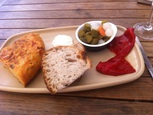 See photo gallery.This morning I took the 6:50 bus from Burgos to Leon. Having skipped the Meseta by riding busses from Logrono to Leon, I chopped two hundred miles from my walk. I arrived in Leon about 9:00 and had breakfast (a quarter pounder with cheese, fries, and a Coke) at a McDonald's! I then found my way to the tightly organized Albergue Santa Maria de Carbajal, run by Benedictine sisters, which opened at 11:00. Outside, I hung on the line the clothes in my bag that I earlier had packed away damp. I took a nap without showering, then figured out a walking plan for the rest of the trip. After a while, I showered, got back into my same purple shirt and light zip-off pants, then put on my Sanduk shoes and walked across the plaza for dinner. I had a tortilla con potatas with pimentos and a glass of vino tinto with pinchos (pickled onions, olives, cucumbers, & carrots). Before going to bed, I sat in a large elm's shade outside La Santa Sed and tasted a milky, yeasty, Palomeres that was also from Leon.
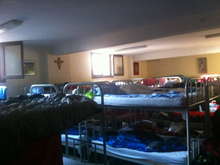 The bunks in the albergue were packed together so tightly that it was as if the woman to my right and I were sharing the same bed. I wished for her sake I had been in a better mood, but, sadly, I did not want to talk to her or anyone. I had noticed in the courtyard and at dinner that she seemed to be walking with her son who looked a year or two younger than mine.
I fell to sleep hoping to feel better in the morning.
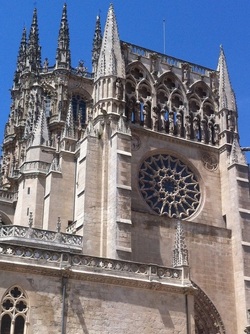 See photo gallery.I left the albergue by 6:30 a.m. After having a cup of coffee and a croissant, I crossed through giant-leafed vineyards into the renown Rioja region on my way to Logrono. I hoped to find a bus in Logrono which would take me to Burgos. It had rained during the night, so the fields were damp and cool. I tiptoed around puddles and tasted green and purple grapes, wishing it had been a bit later in the season so that I could have enjoyed them at their plumpest and sweetest. Outside of Logrono, I got a sello (stamp) in my credencial (pilgrim's passport) and purchased a couple of small souvenirs from Felicia, Logrono's gatekeeper so to speak. Eventually, I made it into Logrono, found the bus station, purchased a ticket, and, after a couple hours' wait, traveled to Burgos. As you probably figured, I was miserable in Burgos. I skipped dinner because I was in pain and did not want to walk to find food. I did, however, tour the nearby Burgos Cathedral, because I could not have come that far and not have seen it. I was sorely discouraged, but I controlled what I could control and genuinely did what I could to make the best of my difficulties.
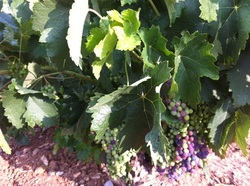 The Burgos Cathedral was indeed majestic and the grandest thing I had ever seen. I wondered how the Cathedral in Santiago could possibly top it. I was saddened, however, to see what had once been a sacred place overrun with tourists. I had to work on my attitude, because I found revolting everyone who held their phones up and took pictures of themselves every-which-where. It seemed as if their lives had been reduced to a series of photo opportunities. But, then again this revulsion came from a crabby, miserable lady. At least the people taking pictures of themselves were smiling.
While in Burgos, I saw the dark-haired Matt Chism/Dave Thaxtonish guy who had been on the same train as I from Bayonne to St. Jean Pied de Port. I had seen him at one other albergue along the way as well. He was still looking as lonely, awkward, and miserable as I.
While in Burgos, I wished I had gotten to know Pillar, a woman I had spoken with at the albergues in Orisson, Arre, and Vianna. I was in her city of origin now-- the city where she would finish her Camino. She had spoken only Spanish, and it had seemed too hard when I was exhausted to try to communicate, but, there in Burgos, I asked God to bless her and hoped she would find what she was seeking on the Camino.
See photo gallery.Before writing about the walk to Viana and telling of the friendships I made with my Danish and German roommates there, let me write a bit more about my time in Sansol with the Spaniard, the German, and the Silly Old Dutchmen. If I had gone on a little farther to Torres del Rio, instead of stopping at the albergue in Sansol, I would have had my pick of three nice albergues and could have enjoyed a lively cafe scene, but, having been thrashed by the end of the day and replete with suffering, Sansol was as far as I made it. I was greeted at the Sansol albergue by (what I thought was a teen-aged boy, but whom I later found out was) a forty-one year-old Barcelonian school teacher named Antonio or "Tony." Tony, a very beautiful and lean, tiny man with turned-in incisors, told me that the hospitalera had gone to care for her elderly father and gave me the choice of two dormitories to sleep in. It looked like the Silly Old Dutchmen had already settled into the first, so I chose the second. A bit later, Tony moved his belongings from the first to the second as well. He said it was because the second was "airier," but, as the night wore on, I understood better that he did not want to be in the same room with the Silly Old Dutchmen. Tony, a disciplined peregrino who walked great distances from sunrise to noon each day, had arrived in St. Jean Pied de Port at the same time as the Silly Old Dutchmen. He had met up with them time and again at various albergues along the way and knew firsthand of their shenanigans. He whispered to me, "It is all one big party with them," and "They smoke marijuana." About 6:30 p.m., after showering, doing my laundry, and otherwise puttering around the albergue, I set out to find a meal. I went to the one and only place in town: a grungy dive. Scuzzy, aka Long-Haired Stringbean Man (who was gone, Gone, GONE on something) was tending bar and Nearly-As-Greasy-Haired Dumpling Woman was in the next room cooking. (I chose to believe that Dumpling Woman's hair looked "damp" because she was "warm.") When I entered the bar, I saw two of the three Dutchmen sitting at a table with Christian, a German man whom I had met at the albergue in Villa Mayorga. Christian and I had passed one another on the road at various times, and he, seeing me struggling with my foot, had often asked how I was doing. Christian and the Silly Old Dutchmen were all speaking in German. They had had plenty to drink and, needless to say, were very merry. As I walked in, Tony quietly pulled out a chair for me at his table, and said, "Please come sit down." I realized later that he was trying to save me from the Dutchmen. Tony ordered for me in Spanish (thin beef loin, fried potatoes, and salad) and poured me a glass of a Rioja wine. I asked him why red wine in Spain was served chilled. He did not answer why it was cold, but he did explain that this wine was a (in his opinion not-very-good) young wine, that Crianzas and Reservas were aged three and five years, and that the plants' roots were crushed and included in the making of the Rioja wines. We talked about Spain's complex economic problems and a few other topics, but mostly, I texted my family, and he talked with his, on our phones. After dinner, Tony left to visit a church. I was about to leave as well, when the Silly Old Dutchmen and Christian, who were now at a table outside in the rain, persuaded me to sit down with them and have a glass of wine. Tony, who was partway down the road, threw his head back and laughed as he watched them suck me in: "Sit down and have a Rioja," they charmed, "It will make you sleep better!" They poured me a small glass, and we chatted for a while. They were goofy because they were so well-lit. The Second Dutchman, Hank, was real Devo-ish with the coolest, trendiest glasses. When I asked the Third Dutchman Jaap (which apparently means James in Dutch) what he did for a living back home, he said he was a director of a school. I was amused and amazed as I imagined this toasted man, who kept referring to America as "the other planet" in his dignified profession. I should not have been surprised that they were so nutty. When I had first encountered them a ways out of Sansol, they were "full of spizzerinctum," as my dad used to say, even then. Jaap, then marching in the rear, kept loudly proclaiming, "I am finished! Huh. I am finished! Huh. I am finished!" and telling the First Dutchman, whom I never actually met, "You must put me on your back and carry me the rest of the way!" Back at the table in the rain, they insisted that I go to Logrono the next day with them, "We will all taste the wines of the Rioja region together!" I told them, no, no, I could only go as far as Viana because of my foot and slow pace. Jaap told me that was nonsense, pulled off my shoe, and inspected my foot (while the German, attempting nonchalance, pulled out his camera and took pictures of my four and a half toes). Eventually I convinced them that I did in fact have bone issues, not just blisters, and would not be going on to drink wine with them in Logrono. About then, Jaap made an exaggerated gesture and spilled his entire of glass of wine on my shorts. Christian then spilled his wine on his pants. As I headed back to the albergue in the rain, I could hear them laughing and carrying on about our "sister stain memories." It continued raining throughout the night, and, though the sun was shining when I set out the next morning, walking through the damp fields, with the doves cooing so loud and so long, was like walking through an exotic tea shop with a kitten purring in my pocket. Truly, I found the best part of the trip to be all of the smells! Some I had not smelled since I was a child. I had a very good day of walking from Sansol to Viana. I did not go far but was stronger. I walked among vineyards, pine forests, and olive and almond groves. My feet were extremely pained by the end, but I had pounded the trail harder and had used a faster stride. That said, I was glad that the bar with the pilgrims' menu was only fifty meters from the albergue, as I could not have hobbled any farther into the city for dinner. 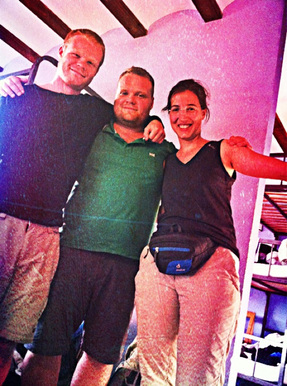 The bunks in the albergue were stacked three high and had filled by early afternoon. In my room, from London, were Lorenzo (a friendly but opportunistic spoiled prig who was on his fourth Camino because he had "nothing else to do") and his so-skinny-he-had-to-have-a-tapeworm companion David. Listening to Lorenzo expound about anything-and-nothing-at-all made clear the line in FOUCAULT'S PENDULUM, when Belbo says, "Ma gavte la nata," which means something like 'unplug the cork, and let out the wind.' Also, in the room, from Germany, were Ana, who bunked above me; and, from Denmark, two brothers Rass and Tjelle.
I wound up having a lovely time with Rass, Tjelle, and Ana. We talked for hours. It was such a lot of fun! Poor Ana's foot was so badly swollen, though. She had planned to walk to Santiago, but would be returning home the next day. She studied theology in Germany. Rass studied Philosophy in Copenhagen, and I am unsure what Tjelle did. I think he had studied to be a teacher, but I do not believe he was one. He was so good and kind like Jaust in the Sheen-Estevez movie. They were such terrific boys. They had asked me to join them at the cafe for dinner, but I had declined. I was so tired and could not believe that they seriously would want to have a real conversation with an old mom like me. Back at the dorm, though, the four of us had the best time. We talked about things that really mattered. Something about our all being so broken down physically and emotionally made us start the friendship from a different place. What an unlikely quartet we were: a twenty-four-year-old, a twenty-six-year-old, a twenty-whatever-Ana-was-year-old, and a forty-eight-year-old me. Suffice it to say, it was a very special evening at the albergue.
I am done walking. I just collapsed onto a bed. I will shower soon. How do I say, "It's wonderful!" and not "It is excruciating"? I cried and cried a while ago, as I surrendered to the Camino a mile and a half from this town. There is much great about my adventure, but the walking is so unbelievably painful: three blisters, Achilles tendonitis, and my other "bad foot" stuff.
Before I set out this morning, a rainbow graced the Villa Mayorga sky. I talked for a while at the albergue with a thirty-year-old American gal who volunteers there. She lives in Santiago and is a part of a small team who hopes to purchase a building in order to create a refuge for pilgrims seeking Christianity. She was more of the Teen Mania/YWAM/Campus Crusade for Christ missionary brand. Although I am not a fan of anyone who thinks they have the complete handle on Big-T truth, I was very interested in her vision and impressed by her resolve. She told me how Mexicans seeking a path to U.S. citizenship often come first to Spain and obtain dual citizenship, because it is easier for emigrants out of Spain to gain legal admittance to the U.S. in order to live as permanent residents for the required five years before applying for naturalization.
After saying goodbye to the girl at the albergue, I followed the yellow arrows through Villa Mayorga. I worried about how hard the day would be and wondered whether I would see anything as sweet as the foal I had seen take its first steps the day before or walk through another wind tunnel screaming cold air at me like an automatic car wash blasting air at a rinsed-off car.
What I did see this day were dill fields, almond and olive trees, a valley of cairns, and a cemetery with the following inscription above its entrance: "Yo que fui lo que tu eres; tu seras lo que yo soi" (What I was, you are; what you will be, I am). I saw vineyards, red and pink dirt, and a yard full of painted metal pilgrim-shaped cutouts.
I was beckoned to a porch by a vineyard owner saying, "Come and drink a 'veen' with me." I bought an ankle brace, some sunblock, and a blister pad, and ate cannelloni with a glass of Sangria for lunch in Los Arcos.
When it could not get any hotter and I could not climb another craggy hill, I sat under some scratchy bushes on straw-strewn baked ground and cried and cried and cried. I stopped when I heard three men (hereafter dubbed the Silly Old Dutchmen) come around the bend in my direction. After they passed my spot (while I was in the bushes doing what peregrinos do in the bushes), I followed them into Sansol where we are stayed at the same poorly maintained (by someone surely named Brunhilde) albergue.
See photo gallery.I have been on The Camino seven days! I have a scab on my nose and two on my lips from the sun. Today, I walked from Lorca to Villa Mayorga-- much farther than I had intended. A little way before arriving in Estella, I met Igor from Slovenia. Igor was thirty years old, bright red, with an oversized, very-round, bald head. He looked a lot like the pictures of children in Children's Research Institute type donation drives. Igor loudly laughed through every Italian-accented syllable he spoke. He was not particularly attractive, but there was something so beautiful about his simplicity and goodness. We walked and talked for a long while, with him slowing his pace way down to accommodate me. We walked into Estella, purchased goods from a store, then sat under an elm tree's shade to eat. We were joined by Eindt, an older somewhat-arrogant German pilgrim whom Igor had previously walked with on the Camino. Eindt had run many marathons in the past, but expressed how very different and difficult he had found walking The Way to be. Eindt was planning to walk all of the way to Finesterre and to rent a seaside cottage there. After Igor had finished his lunch, I told him that I planned to stay in Estella, so he walked on. I had not entirely decided to stay there, but I was not sure about him and wanted my space and quiet back. After he had left, I decided to continue walking as it really was too early in the day to stop. I got turned around in the city, but I finally made my way through it. Just past the cemetery, I turned around and found Igor following me. At first, I was embarrassed and worried that I may have hurt his feelings by telling him I would be staying in Estella when I clearly was not doing so. I then became concerned by the fact that he was odd and had maybe been watching and following me. In the end I just walked on with him, choosing to counter the American tendency to suspect the worst about others instead of expecting the best. We walked most of that day together. He was really quite interesting. He was a chemical engineer who owned his own business and was very knowledgable about art, history, philosophy, and theology. He kept insisting I put on sunscreen and he gave me his hat to keep the sun from burning my nose any worse. Together, we visited the Irache Bodega, with me sipping red wine from its fountain, while he rested on a wooden bench and loudly laugh-talked to other peregrinos under its trees. Igor's conversation topics kept my mind off my foot pain, and I tried very hard to hasten my pace so as not to slow him down too much. By mid-afternoon, I could not go on, though, so I stopped in a small village, hoping to find a room, and he went on. There were, however, no rooms whatsoever in that town. I was physically shattered by this point, having walked for hours with the overhead sun beating down on me and the temperature well over 100 degrees. I was in a plaza in that no-room town when I met the Nurturing Hungarian. I had seen him before on the Camino. He was one of the many zen-like men I had seen traveling alone. (Funny, middle-aged women traveling solo looked matronly and forlorn; middle-aged men traveling solo looked healthy and serene.) The Nurturing Hungarian could not speak English, but he could see that I was terribly overheated and ill. He brought me cool water from the fountain in a metal cup with a fizzing lime mineral tablet to revive me. He then left me with a bag of sugar candies to energize me enough to walk on to the next town of Villa Mayorga, which I hobbled into an hour and a half later. Both Igor and the Nurturing Hungarian were at the Dutch Christian albergue when I arrived. There was no space in the dormitories, but I was offered an individual room for twenty-five euros. I spent the twenty-five euros and got a room to myself at the tip top of the house on the fourth floor. It did not have its own bathroom, and I had to shower in another building, but I did not mind. All I wanted was a warm meal, a cool beverage, and beautiful, wonderful rest.
See photo gallery.My foot pain was intolerable this day, but what could I do? I also was very sick to my stomach, and the temperature was over 100 degrees. I walked less in order to try and heal a bit and to have enough time for my clothes to actually dry after hand washing them. I spent the night at an albergue in a village called Lorca. It was a port in a storm. I was served a great meal there: thinly sliced pork with green peppers and warmed cheese, and a tuna salad with asparagus and fruit. Furthermore, the albergue had WIFI, and, for a few hours, I had the room to myself. A young man who spoke English treated me so nicely. His kindness was much appreciated after a not-so-good time the night before in Puente La Reina, where, after I came back from dinner, I discovered that someone had taken all of my belongings off of my bed and put them in a heap across the room. The lights had been off and at first I could not even find my stuff. Once I found my things, I put them back on the bed and crawled into my bedroll, scared that someone was going to come and yell at me or something. Within the hour, two men came to my bed angrily whispering. I kept my eyes closed and pretended to be asleep, and, eventually, they went away. I did not like anything about that monastery-slash-circus at all. The town itself was unkind to strangers. I went into a store to get a cool drink and even the children outside the store were rude to me. They obviously did not like "dirty Trekkers." I am getting behind with my walking and am unable to keep up with the recommended stages in my guide. I was walking eleven hours a day to try to keep up with the pack, but I cannot continue doing that. It does not allow my foot enough time to heal between days and does not give me enough hours of daylight to line-dry my clothes. Sadly, I am unable to think of much while walking except my pain. On the first few days, I took in lots and thought about plenty. Now I am just in excruciating pain. I assume I am being broken down before I will be rebuilt. I did, however, see some amazing things today. After passing flowering mustard and poppies on the way into a village called Cirauqui that towered over its crooked, steep, and narrow streets, I walked over the old Roman highway which is pictured above. I have gotten rid of so much to lighten my pack-- medicines, bandaids, underwear, even my beloved hundred-dollar Therma Rest pad. I have realized on this trip that solitude is the key to peace, but that human interactions and the lack of them are what truly result in joy and sadness.
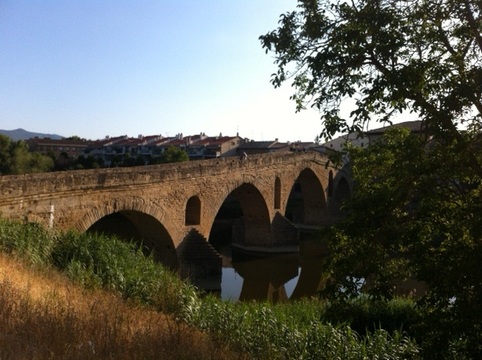 See photo gallery.I arrived a few hours ago in Puente la Reina. I am staying at a monastery. Assuming I can get my VERY painful feet to move down the street, I will set out to find some dinner in a few minutes as I am starving. Yesterday, I walked through Pamplona and stayed the night in Cizur Menor. Pamplona was very energetic, only a week after the festival with the running of the bulls. I spent some time in a gorgeous cathedral there and ate a very garlicky tostada (a large rectangular crouton type bread-thing) topped with jamon. In Cizur Menor, I bunked with two Swiss and two Philadelphian women. I had a nice Pilgrim´s meal of garlic soup (very tasty with bites of sausage), a couple of breaded chicken cutlets, and ice cream. The red wine I was served was slightly chilled and refreshingly thirst-quenching. I drank a glass and a half of wine, which carried me right to sleep when I got back to the refuge. Today, I had quite a climb and descent. At the top was the Pilgrims´ Monument (the point in The Way where Jaust compares his waist to the that of the metal pilgrim in the monument, and Sara translates the inscription for Tom: ¨Where the path of the wind crosses that of the stars.¨) The area was electric with people so happy to have reached the top and all excited to be at that specific significant spot. Lots of windmills line the ridge, and the whir of the windmills had drawn me faster and faster to the top. I have shed a lot of my belongings in order to better handle my backpack´s weight. The lighter backpack and being in better condition made today´s climb better than the first two days´. My bad foot, however, is not doing well. I have faced (and am now trying to accept) the reality that I will not be able to walk the entire 500 miles. My foot can barely handle about half of what I had hoped to traverse each day (though I did walk the entire nineteen kilometers today). I most likely will need to take a bus for a part of it. I am creating voice recordings chronicling the trip, during the stretches when I am walking alone, so I hope to blog from those once home. Well, the Internet timer is about to end, so off I go to take my laundry off the clothesline, to get some food, then head to sleep. Peace to all!
|







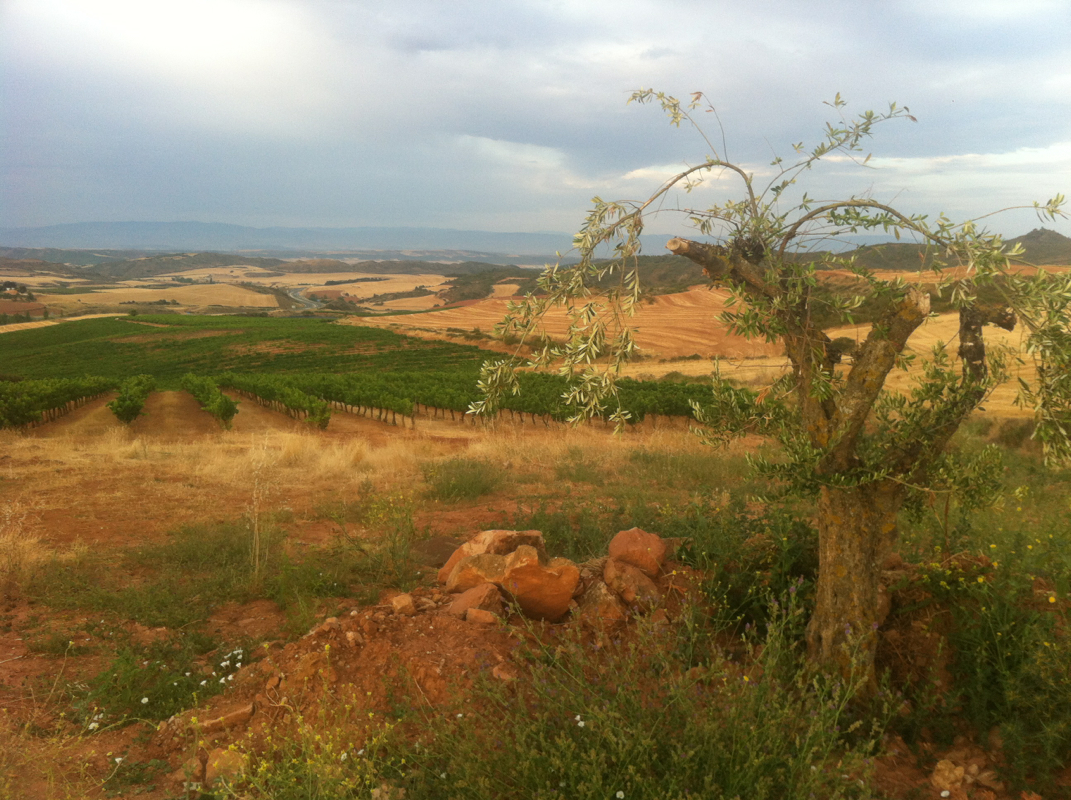
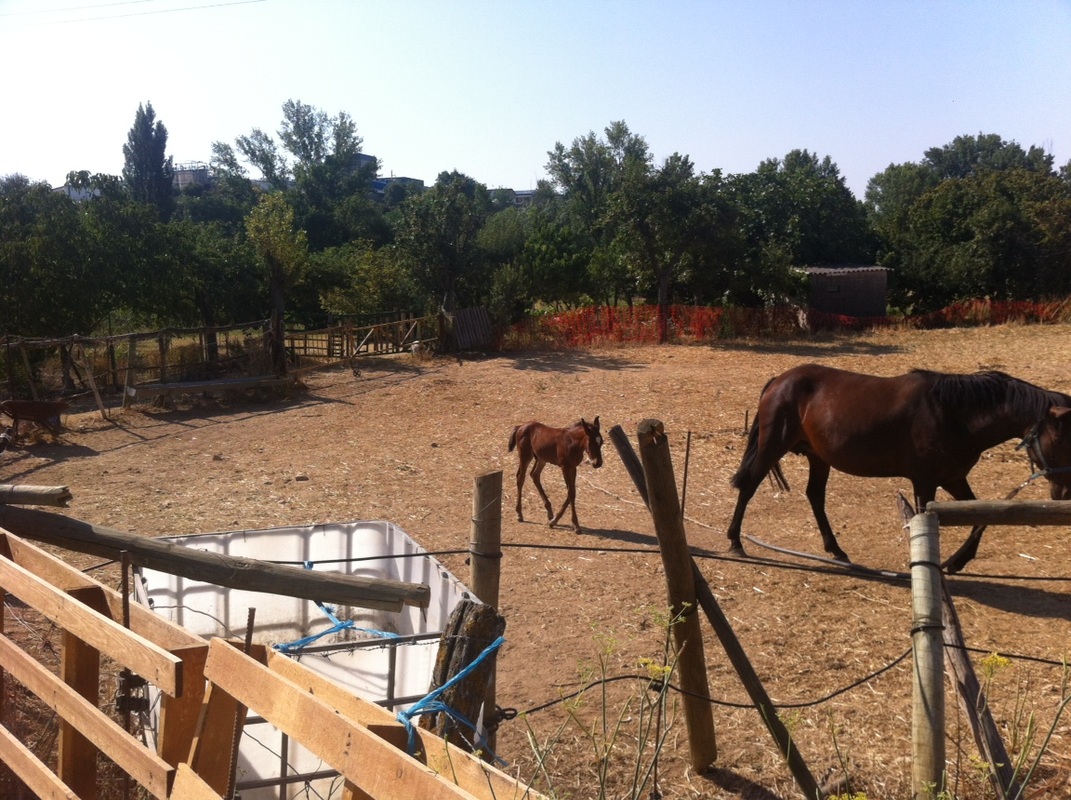
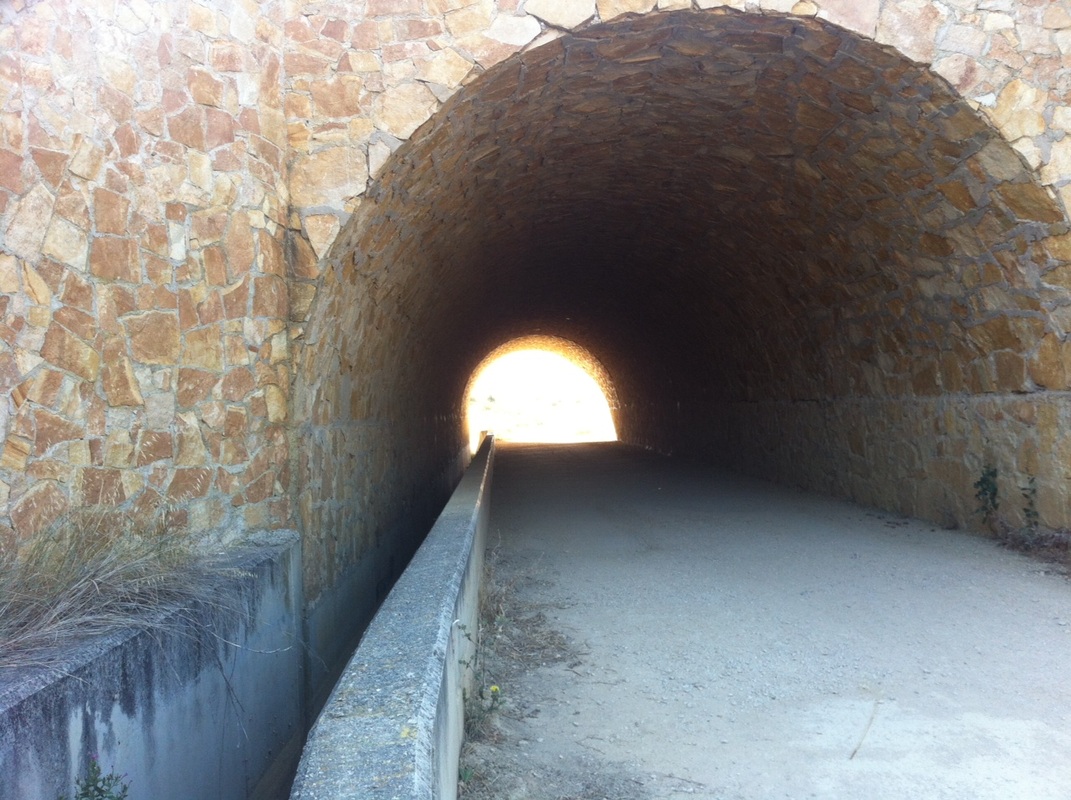
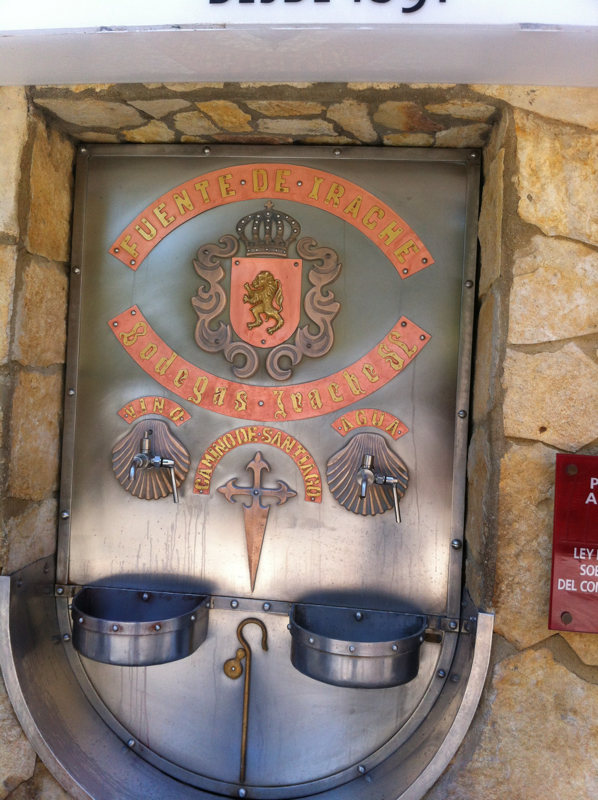
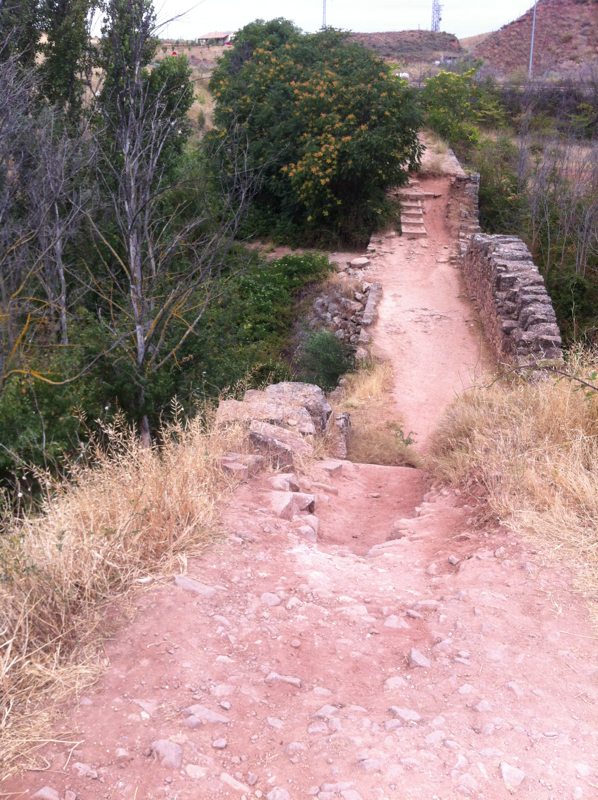

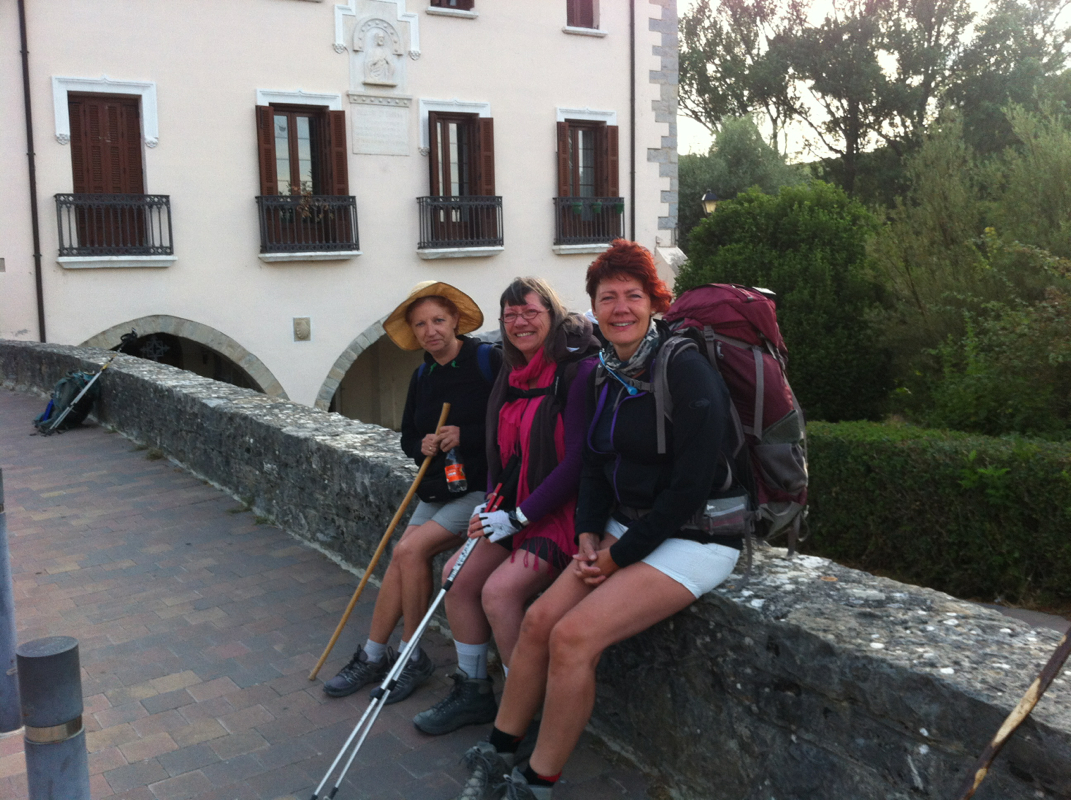
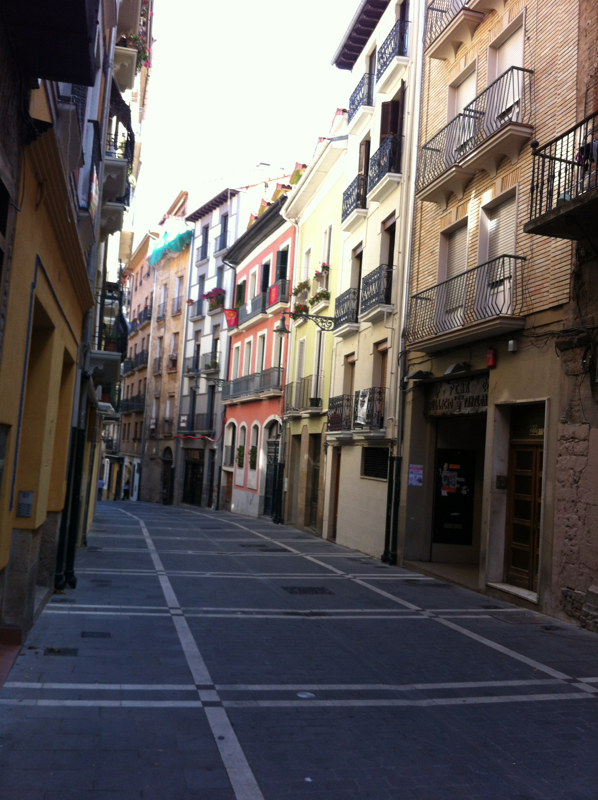
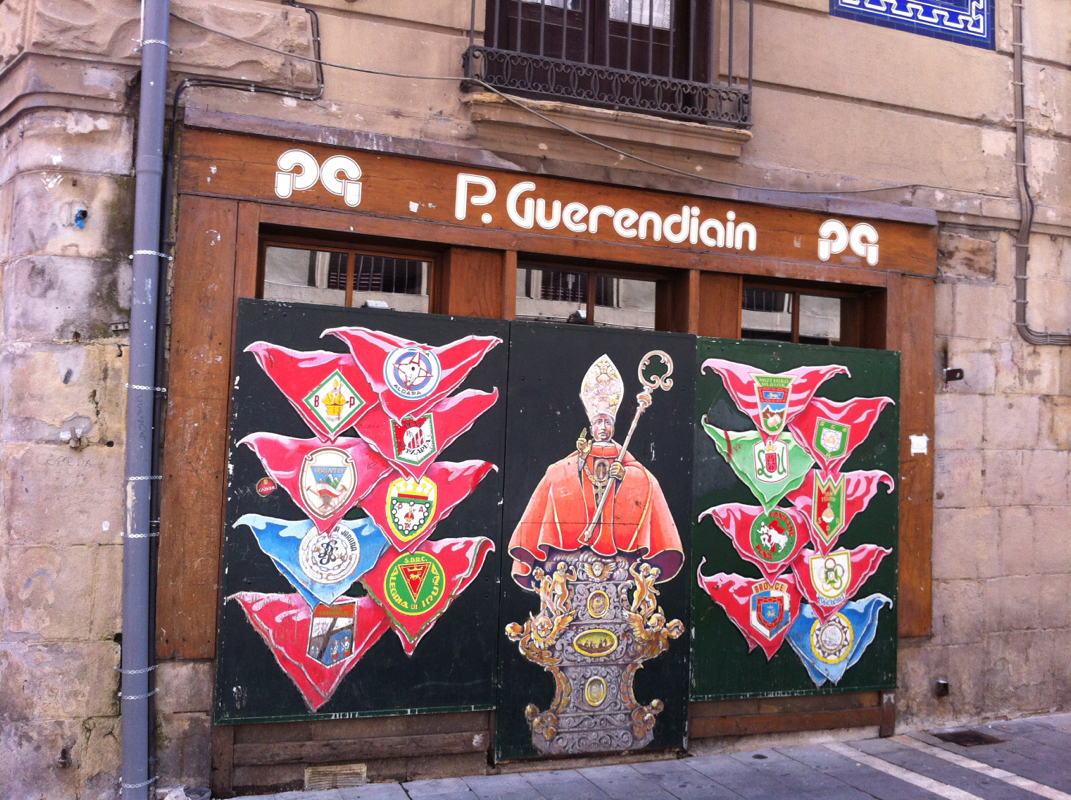
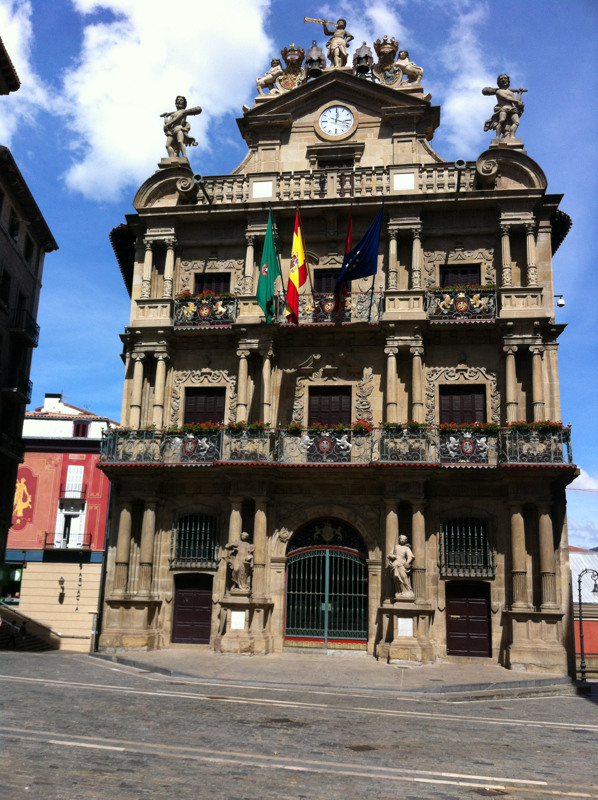
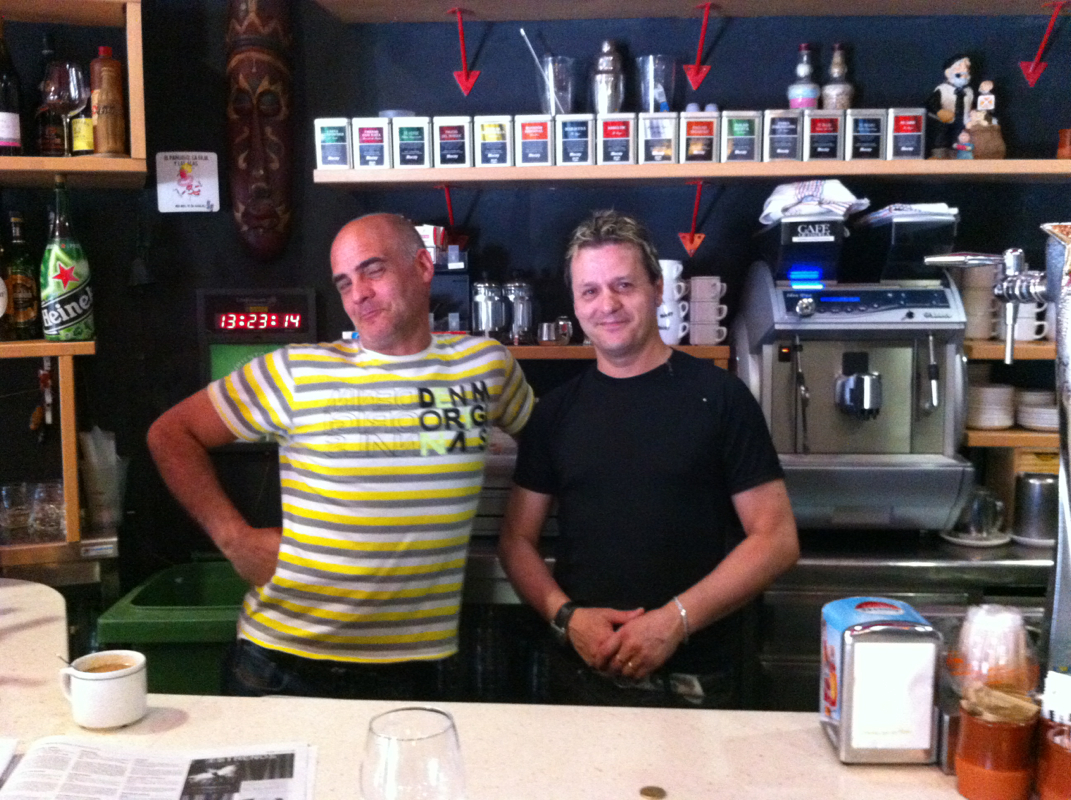
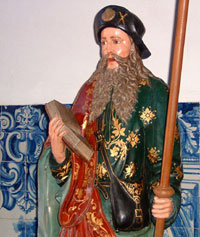
 RSS Feed
RSS Feed